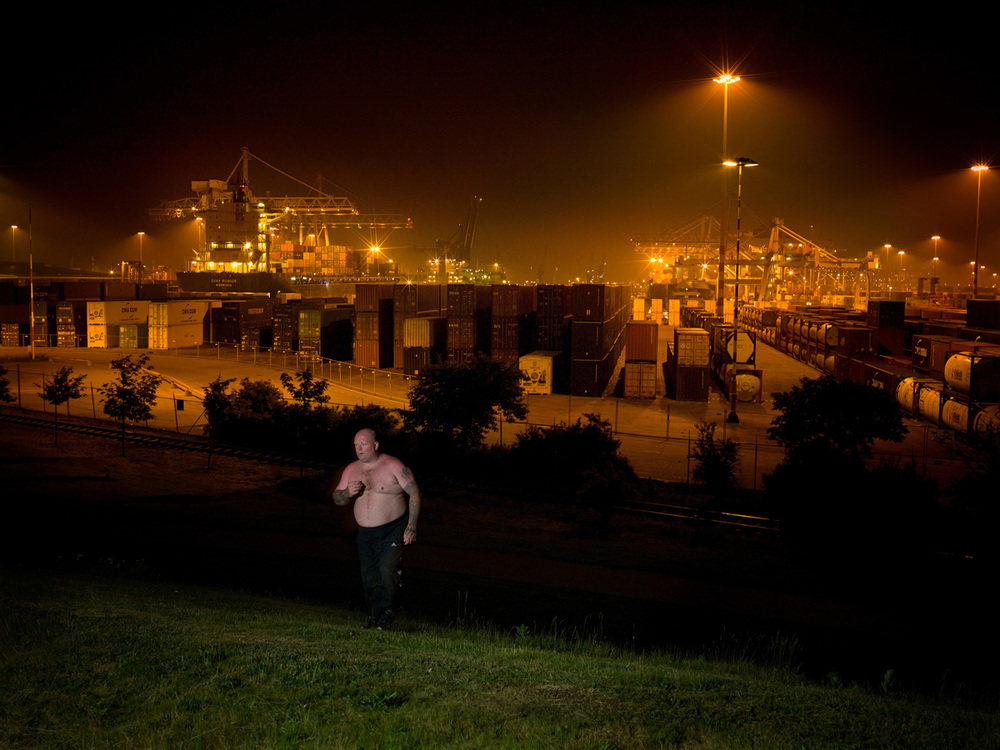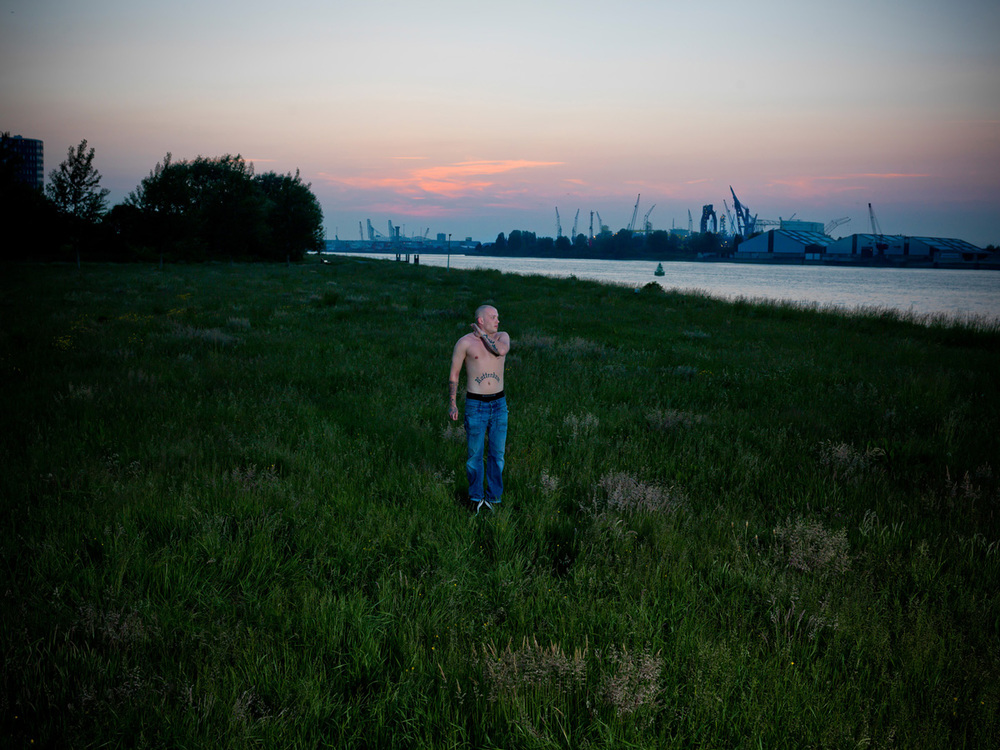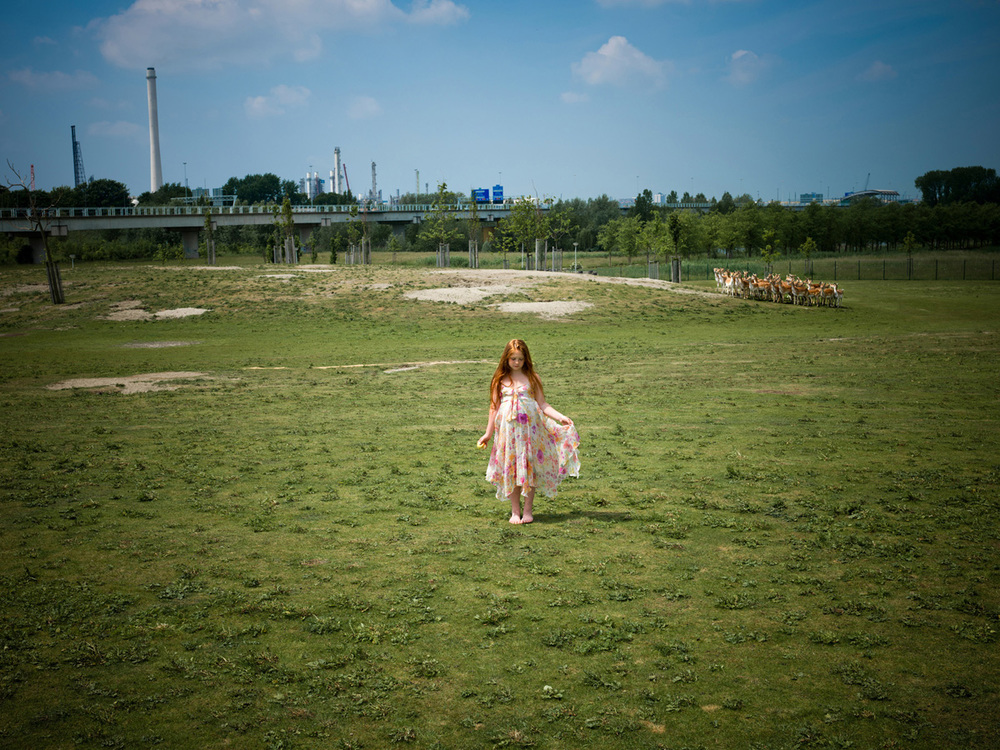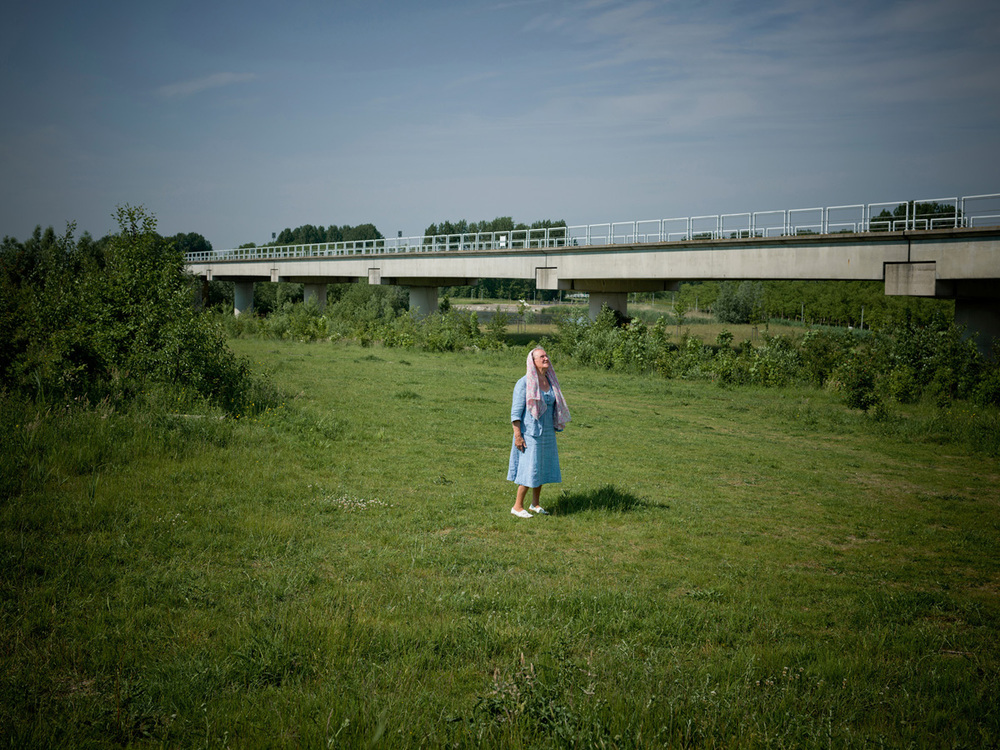
The titles of the images are 'Goddess' (blue granny), 'Eve' (red-haired girl), 'Adam' (boy in green) and 'Devil' snake (man in the night). However, an explicit mention of these titles is not necessary.
This composition forms a four-part entitled
'Paradise Pernis.'
The series encompasses the concept of 'Paradise Pernis', nestled amidst the encroaching realm of industry, aptly likened to a metaphorical hell.
It is important to note that all persons depicted in these images are real inhabitants of Pernis. They wholeheartedly experience Pernis (as I have come to understand) as an earthly 'paradise'. A close-knit community is created, where everyone knows each other. A deer park, an outdoor swimming pool and cozy pubs decorate the area. A pastor and a church are integral components. Generations of families have lived here and often return after years away. My vision of Pernis is a haven where the residents feel deeply safe and at home, where a strong sense of unity has formed in response to external adversities.
A resident of Pernis once said: "We are in a well, so all the noxious fumes blow over." (While I have no first-hand knowledge, it seems likely.)
In short: Pernis has a history that goes back to 1300. It was once a fishing village, but in the 19th century it saw the arrival of Shell, with far-reaching consequences that contributed to the transformation of Rotterdam into a metropolis.
Paradise story
God placed Adam and Eve in the Garden of Eden (Earthly Paradise) and granted them permission to eat the fruit of all trees except the tree of the knowledge of good and evil. They lived blissfully until a serpent (possibly Satan) tempted Eve to consume the forbidden fruit (traditionally an apple). She ate it and shared it with Adam, who also ate it. They immediately became aware of their nakedness and felt shame.
Eve with Cain and Abel
As punishment for Adam and Eve's disobedience, God led them out of the garden into the world beyond. Here Eve gave birth to children, and Adam was given the task of taking care of them. The main consequence of their disobedience, however, was death: "You are dust, and to dust you shall return," declared God.
They were driven from the Garden of Eden and had children. Three sons are mentioned by name: Cain, Abel, and then Seth. Thus Adam and Eve became the literal ancestors of mankind.
The original sin committed by Adam and Eve, which led to the forfeiture of God's favor and their idyllic existence in Paradise, is called the Fall.







The titles of the images are 'Goddess' (blue granny), 'Eve' (red-haired girl), 'Adam' (boy in green) and 'Devil' snake (man in the night). However, an explicit mention of these titles is not necessary.
This composition forms a four-part entitled
'Paradise Pernis.'
The series encompasses the concept of 'Paradise Pernis', nestled amidst the encroaching realm of industry, aptly likened to a metaphorical hell.
It is important to note that all persons depicted in these images are real inhabitants of Pernis. They wholeheartedly experience Pernis (as I have come to understand) as an earthly 'paradise'. A close-knit community is created, where everyone knows each other. A deer park, an outdoor swimming pool and cozy pubs decorate the area. A pastor and a church are integral components. Generations of families have lived here and often return after years away. My vision of Pernis is a haven where the residents feel deeply safe and at home, where a strong sense of unity has formed in response to external adversities.
A resident of Pernis once said: "We are in a well, so all the noxious fumes blow over." (While I have no first-hand knowledge, it seems likely.)
In short: Pernis has a history that goes back to 1300. It was once a fishing village, but in the 19th century it saw the arrival of Shell, with far-reaching consequences that contributed to the transformation of Rotterdam into a metropolis.
Paradise story
God placed Adam and Eve in the Garden of Eden (Earthly Paradise) and granted them permission to eat the fruit of all trees except the tree of the knowledge of good and evil. They lived blissfully until a serpent (possibly Satan) tempted Eve to consume the forbidden fruit (traditionally an apple). She ate it and shared it with Adam, who also ate it. They immediately became aware of their nakedness and felt shame.
Eve with Cain and Abel
As punishment for Adam and Eve's disobedience, God led them out of the garden into the world beyond. Here Eve gave birth to children, and Adam was given the task of taking care of them. The main consequence of their disobedience, however, was death: "You are dust, and to dust you shall return," declared God.
They were driven from the Garden of Eden and had children. Three sons are mentioned by name: Cain, Abel, and then Seth. Thus Adam and Eve became the literal ancestors of mankind.
The original sin committed by Adam and Eve, which led to the forfeiture of God's favor and their idyllic existence in Paradise, is called the Fall.